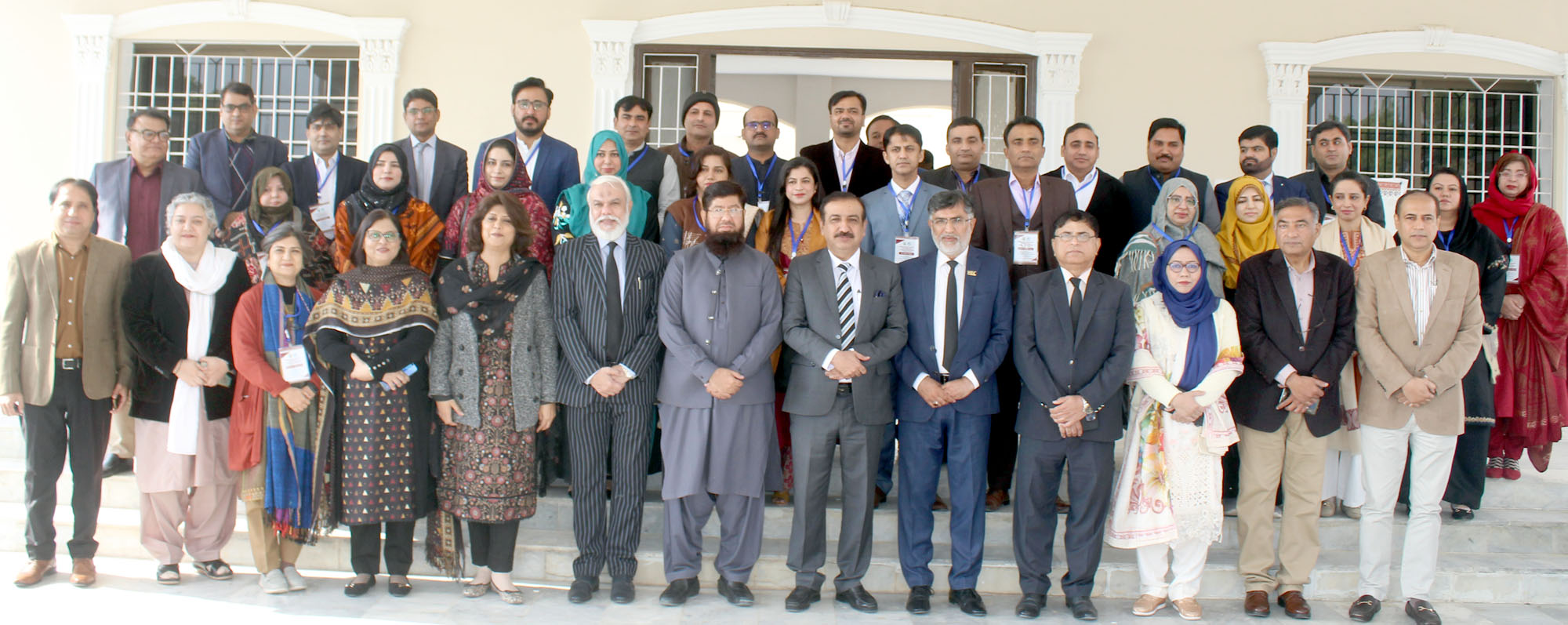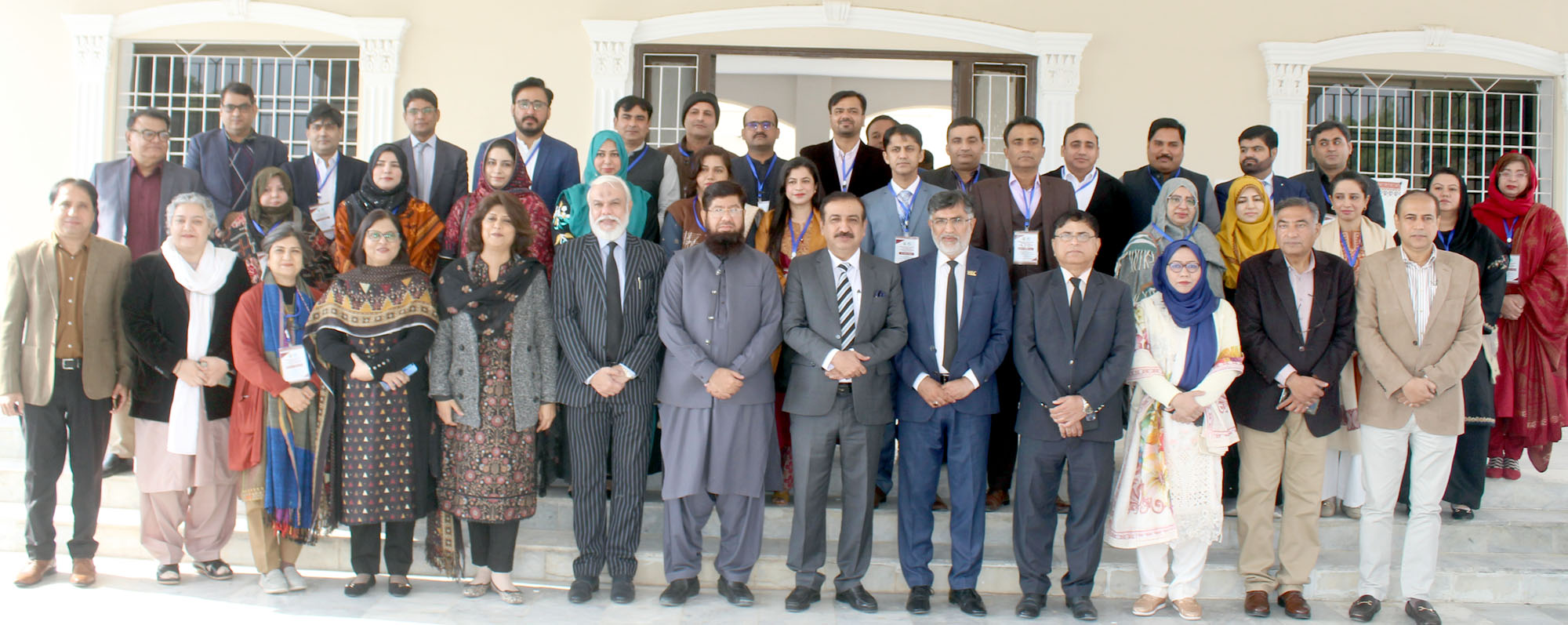
Benazir embodied spirit of Shah Latif’s heroines who created awareness in today’s women, say speakers
Speakers at a thought-provoking seminar held at the University of Sindh on Wednesday have said that Shaheed Mohtarma Benazir Bhutto was the living embodiment of the legendary Sindhi heroines portrayed in the poetry of Shah Abdul Latif Bhittai.
They said that just as Marvi and Moomal symbolized strength, sacrifice and resilience in Shah Latif’s verses, Benazir Bhutto too carried those very virtues into Pakistan’s political arena, particularly through her lifelong struggle for democracy, gender equality, rights of minorities and social justice.
The seminar titled “Struggle of Mohtarma Benazir Bhutto for Democracy” was organized by the Mohtarma Benazir Bhutto Chair, University of Sindh Jamshoro, which was held in the Senate Hall.
In his presidential address, Vice-Chancellor Prof. Dr. Khalil-ur-Rehman Khoumbati said Benazir Bhutto was a true advocate of gender equality and a source of empowerment for women in Sindh, Pakistan and the Muslim world.
“Since assuming the role of Vice-Chancellor, I have focused on women’s inclusion in decision-making — out of five recent postings, three were women,” he noted.
He added that he had reactivated academic chairs that were long dormant, including the Benazir Bhutto Chair. He also highlighted the historic ties of the Bhutto family with the University of Sindh.
"The foundation of the Institute of Sindhology was laid by the former Chief Minister Sindh Mumtaz Ali Bhutto, on the instructions of Shaheed Zulfiqar Ali Bhutto,” he recalled.
Importantly, Dr. Khoumbati also announced that the University of Sindh would soon organize a gorgeous international conference focused on the life, struggle and contributions of Mohtarma Benazir Bhutto.
“Researchers from across Pakistan and abroad will be invited to share their scholarly work on Benazir Bhutto’s role in democracy, women’s empowerment and global politics,” he said.
Dr. Khoumbati further said that the political emergence of Benazir Bhutto awakened awareness among Sindhi women. “If you read the melody of Marvi, you’ll find her courage and sacrifice mirrored in Benazir Bhutto's life. Today’s women are playing key roles in social progress — a legacy of her influence,” he stated.
Former Vice-Chancellor of Sindh Madressatul Islam University Karachi and a close aide to Ms Bhutto Prof. Dr. Muhammad Ali Shaikh said, “All the noble traits of Shah Latif’s seven heroines were visible in Benazir Bhutto.
She joined public protests — like the one against the Kalabagh Dam — proving her commitment to the people’s cause.”
He added that if she had been born in Punjab or Khyber Pakhtunkhwa, she might have been elevated even above national icons like Allama Iqbal in status.
He also emphasized that Shaheed Zulfiqar Ali Bhutto laid the groundwork for Pakistan’s nuclear capability. “The nuclear deterrence we rely on today is the fruit of Shaheed Bhutto’s vision,” he said.
He called for adhering to Ms Bhutto’s legacy of promoting reconciliation and strengthening democracy.
Dr Shaikh said Ms Bhutto was an “exemplary leader” who played a pivotal role in the restoration of democracy and provided political, social and educational awareness to the public.
Former Professor of Political Science at Shah Abdul Latif University Khairpur Dr. Abdul Majeed Chandio said Benazir Bhutto’s governments were heavily constrained by external interventions.
“She was never given a free hand. Had she been allowed to govern independently, democracy in Pakistan would have taken a firmer root.”
He said that throughout her life, she valiantly campaigned against injustices, oppression and prejudices. She faced great difficulties and tragedies, yet she never wavered from her chosen path and continued her struggle to oust arbitrary rulers and thwart nefarious designs of the retrogressive and obscurantist forces till her last breath.
Dr Chandio said Ms Bhutto believed in the “transformative power” of people and envisioned a Pakistan where every child could access education, women could progress as equals and justice was not a privilege but a right.
“Throughout her life, she raised her voice and worked for the uplift of the downtrodden segments of society and women’s empowerment,” he said.
Chairperson of the Department of International Relations Prof. Dr. Ishrat Afsan Abbasi presented a detailed research paper titled “Key Foreign Policy Objectives of Prime Minister Benazir Bhutto (1988–1990 and 1993).”
She discussed core foreign policy goals of Bhutto’s tenure, which included strengthening Pakistan’s ties with the Muslim world, advocating for regional peace and anti-nuclear proliferation, promoting a pro-democracy image internationally, addressing the Kashmir issue through diplomatic forums and balancing relations with the U.S. and China amid regional tensions.
Dr Abbasi further said that Ms Bhutto embodied the spirit of hope, resilience and unwavering commitment to the ideals of democracy and justice.
“She was a trailblazer who dreamt of a Pakistan where the rights of all citizens, irrespective of colour, class and creed, would be protected and the power of the people would reign supreme”, she said.
Chairperson of the Philosophy Department Prof. Amar Sindhu said that Benazir envisioned a people-centric democracy. “For her, democracy was not just about elections but about human dignity, justice and freedom.
She stood against extremism, sectarianism and patriarchal oppression,” she said and added it was not democracy but a form of chauvinism, where women and minorities were not treated equally.
“We are determined to follow her philosophy of human liberty and democratic norms, continuing our fight against terrorism, extremism and any forces that threaten Pakistan’s stability,” she said.
Professor Sindhu said that Ms Bhutto set a new benchmark for democracy, equality and human rights, not only in Pakistan but across the globe.
She praised her unwavering dedication to democratic values, stating that her political struggle and principled leadership will “forever remain a guiding light for the people of Pakistan”.
Earlier, Director Shaheed Benazir Bhutto Chair Dr. Rehana Mallah welcomed the guests and elaborated on the objectives of the seminar. Dr. Fayaz Latif Chandio served as the master of ceremonies.
The event was attended by senior faculty, scholars and students including Prof. Dr. Mushtaque Ali Jariko (Registrar), Dr. Shuja Ahmed Mahesar (Director, Pakistan Study Centre), Dr. Mukesh Kumar Khatwani (Director, Area Study Centre), Dr. Arfana Mallah (Director, Dr. MA Kazi Institute of Chemistry), Dr. Riyazat Buriro, Dr. Waheed Jatoi, Dr. Abdul Razzaque Channa, Dr. Autif Ali Mangi, Haseen Musrat, Gulbadan Javed, Dr. Tania Mushtaque, and many others.


